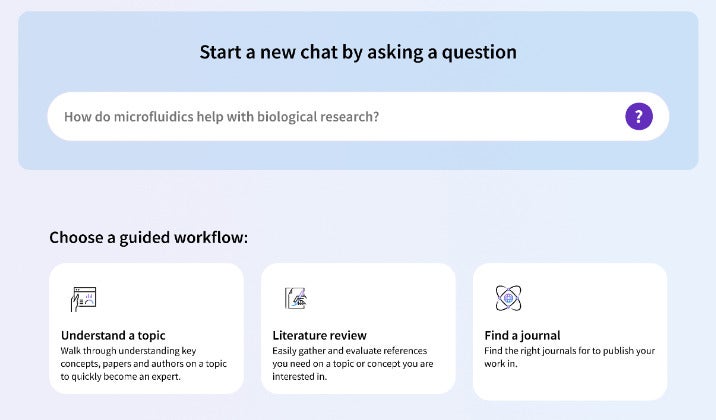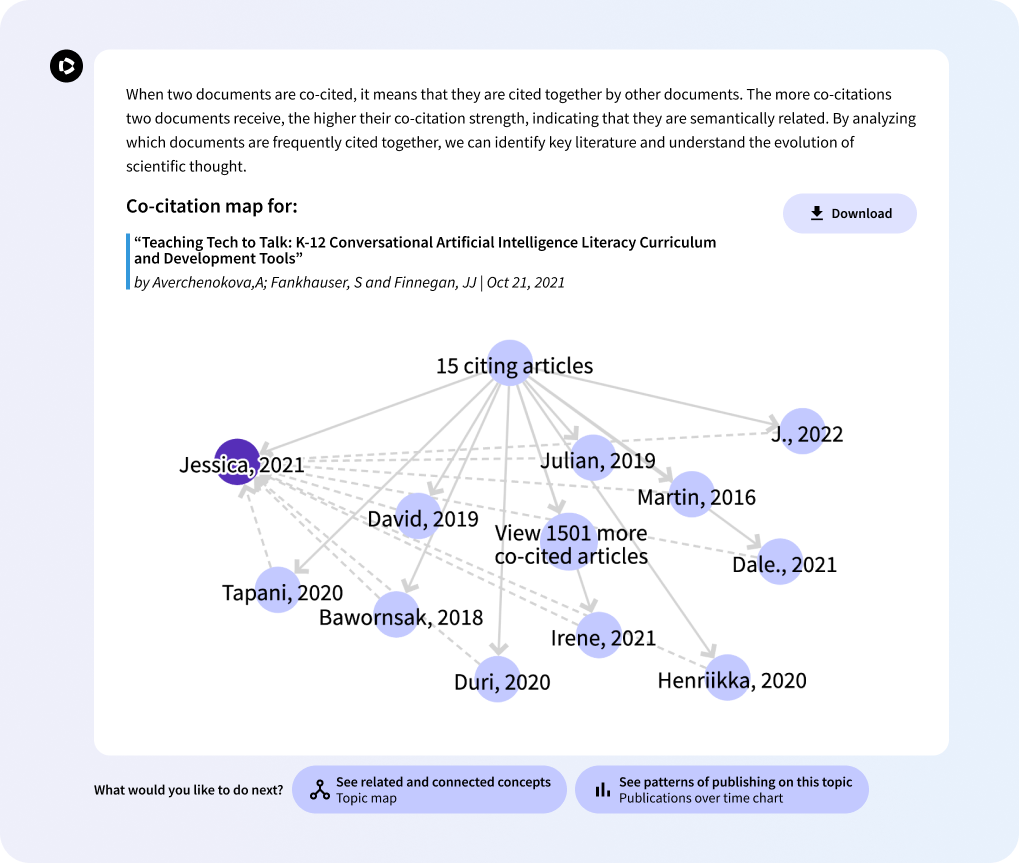Learn about our generative AI-powered Web of Science Research Assistant, which will be available from September 2024.
Last year, we announced our collaboration with the research community to bring a new generative-AI-powered capability to the Web of Science™ — the Web of Science Research Assistant. Since we released the beta to our development partners around the world, we have identified innovative ways to ensure the quality, strength and suitability of generative AI for academic researchers. We are excited to announce that our research assistant will be available from September 2024.
Harnessing AI to support researchers’ decisions
We are carefully considering how AI technology can be leveraged in a way that solves problems for researchers, and we see an opportunity for the Web of Science Research Assistant to provide much more than conversational search. In addition to streamlining discovery of content, the tool will encourage research skill-building and surface useful information on the underlying dynamics of a research field. By proactively serving up relevant, context-specific insights at the point of need, our assistant helps researchers make decisions about their next research step.
Our development partners have also shared positive feedback about the future of the research assistant. Juan P. Denzer, Engineering & Computer Science Librarian at Syracuse University, said “We’re excited about the AI features that Web of Science is developing. I think Web of Science Research Assistant will be far superior to the other genAI tools currently available to faculty and students at the moment.”
We are using AI to help researchers conduct research more efficiently, and we do that in two ways. First, improved search capabilities quickly lead researchers to relevant content. More importantly, we’ll also help researchers tackle complex and involved tasks, such as understanding a topic, finding a journal for a manuscript and completing a literature review. The Web of Science Research Assistant offers innovative functionality that complements our broader AI-assisted search experience. Our goal is to help researchers at all levels get more out of their interactions with the trusted publication and citation data in Web of Science Core Collection™.

Figure 1: Web of Science Research Assistant interface
As we further develop the research assistant, we are also improving the general search experience in the Web of Science in parallel. Natural language, semantic search provides users with more flexibility. Keyword suggestions and spelling corrections offer a smarter search experience. And restructuring our document and author search interfaces will make it simple to locate experts on a topic using our meticulously indexed data.
Key features surface deeper research insights
Web of Science Research Assistant takes the idea of an enhanced, simplified discovery experience even further.
- Multilingual searching creates a more efficient environment for users, where they can find content and explore its relevance in their own language.
- Commentaries of search results spanning over 120 years of research help users swiftly explore foundational and emerging topics.
- Contextual, timely prompts reveal additional ways to view and understand the data or refine the scope of a research question.
- Unique data visualizations bring the myriad connections between people, papers and concepts into focus.
The Web of Science Research Assistant delivers relevant information at the right time without requiring users to navigate search and visualization menus.

Figure 2: Co-citation map in Web of Science Research Assistant
A user can approach the Web of Science Research Assistant with a broad range of question types or tasks in mind—a search for research articles only scratches the surface of what the tool can do.
For example, in addition to retrieving results and highlighting top cited papers, the research assistant can also reveal how and why researchers are citing a paper by leveraging enriched cited reference data. This additional context offers researchers a signpost so they can more adeptly explore the literature.
Or take the example of a researcher trying to find the best-fit journal for their manuscript. An author may take many factors into consideration when submitting a paper, and the research assistant guides the user to descriptive profiles of potential matches based on the title and abstract of a paper.
Partnering with the community to responsibly implement AI
By partnering with the community and leveraging our high-quality, reliable data and expertise, we are responsibly implementing cutting-edge technology in the Web of Science to improve research discovery and analytics. We strive to create an engaging, insightful researcher experience, and we are excited to continue that journey with the Web of Science Research Assistant.
Learn more about the Web of Science Research Assistant here and more about our approach to Academic AI here.





